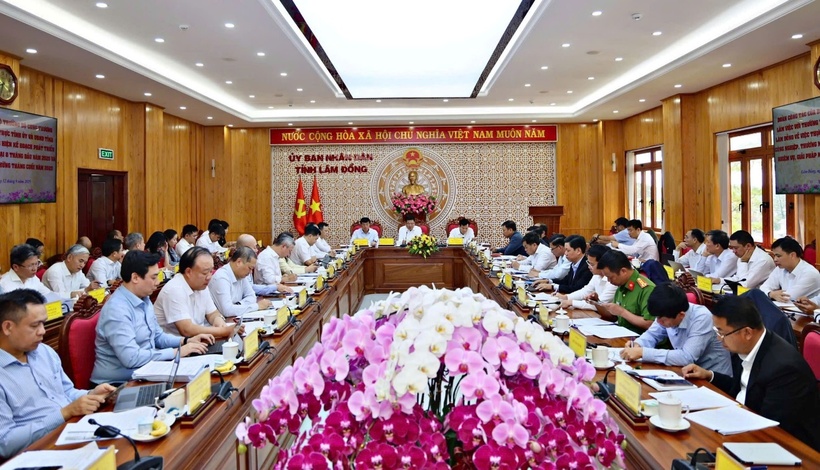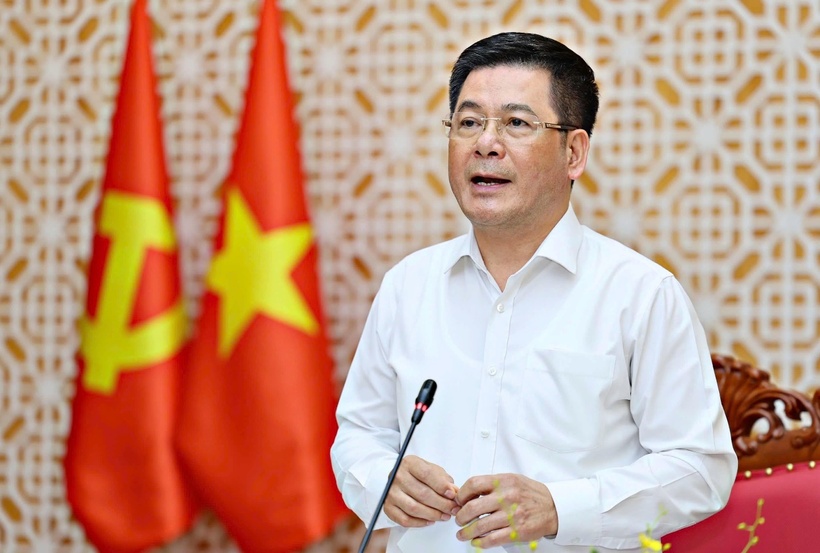MoIT leader works with Lam Dong Provincial Party Standing Committee
Minister Nguyen Hong Dien led a Ministry of Industry and Trade delegation in a working session with the Lam Dong Provincial Party Committee and People’s Committee.
On September 12, a working delegation from the Ministry of Industry and Trade, led by Nguyen Hong Dien, Member of the Party Central Committee and Minister of Industry and Trade, held a working session with the Standing Committee of the Lam Dong Provincial Party Committee and the Provincial People’s Committee.
The meeting focused on reviewing the implementation of industrial and commercial development plans during the first eight months of 2025, as well as outlining tasks and solutions for the remainder of the year.

A delegation from the Ministry of Industry and Trade worked with the Standing Committee of the Lam Dong Provincial Party Committee and the Provincial People’s Committee.
The session was attended by representatives from functional units under the Ministry of Industry and Trade, leaders of the Lam Dong Provincial Party Standing Committee and People’s Committee, along with heads of provincial departments and agencies.
Positive highlights in industry and trade
At the meeting, Vice Chairman of the Lam Dong Provincial People’s Committee, Le Trong Yen, delivered a brief report on the province’s industrial and commercial development performance in the first eight months of 2025 and presented key tasks for the final months of the year.
According to provincial leaders, with strong determination, Lam Dong has mobilized all available resources and implemented comprehensive measures to ensure economic growth of at least 8% in 2025, aiming for 10-10.5% growth during the 2026-2030 period, in line with Government directives.
As a result, Lam Dong’s socio-economic situation has remained stable over the past eight months. The industrial sector has sustained growth momentum, trade has recovered strongly, and exports have maintained steady increases. Notably, the province has successfully carried out key tasks in organizing and operating the two-tier local government model.
For the remainder of the year, Lam Dong faces heavy tasks to achieve its growth targets. The province will prioritize resolving bottlenecks in production, business operations, and project implementation, particularly major projects in renewable energy, bauxite-alumina, and titanium. In parallel, support for exporters will be strengthened, while market inspections, anti-smuggling, and anti-trade fraud measures will be intensified.
After hearing local reports, leaders of departments and agencies under the Ministry of Industry and Trade, together with business representatives, provided comments on technical safety, hydropower reservoir safety, industrial explosives, trade promotion, event communication, and other relevant issues.
Six priority tasks
Speaking at the meeting, Lam Dong Provincial Party Secretary Y Thanh Ha Nie Kdam expressed deep appreciation to the Minister and the Ministry’s delegation for choosing Lam Dong as their destination.
“The Ministry’s visit demonstrates Minister Nguyen Hong Dien’s close attention and guidance, as well as the Ministry’s sense of responsibility and practical support in addressing challenges and promoting socio-economic development,” the Party Secretary said.
He also emphasized that Lam Dong is fully aware of the challenges ahead and must strive harder to break through and become one of the leading provinces in the Southeast region.
Minister Nguyen Hong Dien, in his concluding remarks, outlined six priority tasks for Lam Dong to achieve its growth target of 8.3-8.5% and effectively operate the two-tier local government model.
First, the province must thoroughly implement the Party and State’s policies and guidelines on socio-economic development for 2025 and beyond.

Minister of Industry and Trade Nguyen Hong Dien delivered directives at the working session.
Second, Lam Dong should review and adjust its provincial planning for the new development stage, based on an open spatial structure that integrates ecological zones, highlands, midlands, and coastal areas, creating a unified and interconnected framework.
Third, the province needs to resolve pending issues to put into operation energy and mineral projects already underway. A provincial steering committee should be established to evaluate and resolve each project, avoiding situations where large-scale investments remain idle. Capable investors must be selected to implement wind and solar power projects already included in planning.
Fourth, focus should be placed on developing key competitive industries, particularly processing and manufacturing. The province should apply advanced technology, promote deep processing of signature agricultural products, and attract strong investment into industrial zones and clusters.
Foundational industries such as mechanical engineering, electronics, materials, and energy should also be encouraged to form value chains and integrated industry–urban–service ecosystems. In mineral exploitation, Lam Dong should not stop at alumina production but move towards deeper, modern processing to support other manufacturing sectors, while also continuing renewable energy development to become a national energy hub.
Fifth, in trade, Lam Dong should expand commercial infrastructure, integrate traditional trade with e-commerce, particularly cross-border e-commerce, and take advantage of FTA markets such as Mexico, South America, and Africa to broaden sustainable exports. Stronger links between tourism and trade should be forged, the night-time economy promoted, and effective trade promotion campaigns organized to connect supply and demand domestically and internationally. Developing local brands and complying with international standards on sustainable trade (e.g., anti-deforestation, legal fisheries) are also essential.
Sixth, resources must be concentrated on effectively implementing the two-tier local government model. The biggest challenge at present lies in shortages of both manpower and facilities. The province needs to classify and evaluate staff capacity by position, provide training and skill updates, and second specialists from higher levels to grassroots positions for hands-on guidance. A clear job framework should be developed, with proposals to supplement staff as needed. Close coordination with the Ministry’s functional units is required to resolve bottlenecks, while active participation in training and workshops organized by the Ministry should be ensured.
Additionally, the province should accelerate digital transformation, build specialized databases, particularly shared databases, ensuring accuracy, completeness, consistency, and interoperability to meet local professional needs.
“Matters within the Ministry’s jurisdiction will be resolved and responded to in writing. Issues beyond the Ministry’s authority will be reported to the Government or referred to relevant ministries and agencies for coordination,” Minister Nguyen Hong Dien emphasized.



